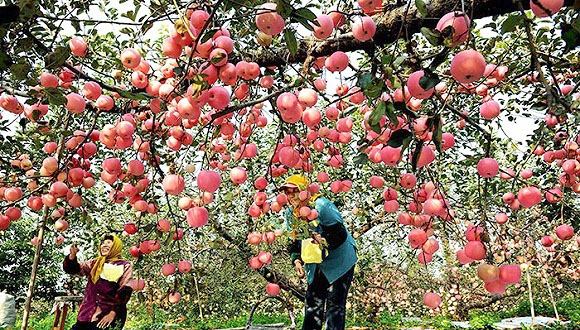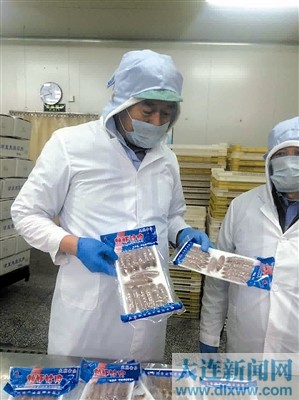When apples are ripe, when Qixia fruit growers meet fresh e-commerce,
It seems unrealistic for Qixia Apple to fully replicate Chu Orange's production and marketing model. however, Chu Orange's success has given Qixia, which is rich in apples, the idea of branding agricultural products, and fruit growers and dealers also hope that this will make things different.

The blizzard brought by the cold wave in late November upset Wang Le, a post-80s native of Shandong. Due to snow, the highway in and out of Yantai was closed, Wang Le will operate the online shop "Wang Xiaoer Orchard" apples, stranded in the express transfer station. He telephoned impatiently and asked customer service and logistics companies about the state of road traffic.
"Singles' Day has just ended." Wang Le will tell the interface news reporter, "We are now embarking on the double Twelve event." Busy, really busy. "
Wang Lejiang's apples come from Qixia, a county city under the jurisdiction of Yantai. In the second half of the 19th century, American missionaries introduced North American apple seedlings into Qixia and produced sweet and sour juicy varieties by grafting and crossing with native varieties.
Apple is not only the pillar industry of this hilly and mountainous inland city of Shandong, but also a business card of the city. In 2014, the output of Qixia apples reached 2.6 million tons, and Qixia people called their hometown "the apple capital of China".
On the streets of Qixia, the image of Apple is everywhere: abstract sculptures with apple themes stand in the citizen square; "Yantai apples" are posted everywhere at the doors of courts, police stations and various government departments. "Qixia flavor" posters; bus stations, traffic isolation railings, street lamp racks, and even cellar covers are decorated with all kinds of apples.
The Qixia Apple Art Festival is held every year in late October, and 2015 is the 14th year. At this time, the streets are full of apple farmers and apple harvesters. However, like most agricultural products, apples have so-called big and young years. Qixia apples are ripe once a year, farmers know little about the market information, and the industrial structure is single, which further magnifies the impact of cyclical fluctuations of market prices on the local economy.
"when the price is good, I always think it can go up, so I don't want to sell it. Once it falls, dealers find it unprofitable to sell apples, so they don't accept them. If Apple is unsalable, it will lose a lot of money. " Wang Hengqi, secretary of the Qixia Municipal Committee of the Communist Youth League, said, "growing and selling apples is the most important thing for most Qixia fruit farmers in a year. If the apple does not sell well, the lives of ordinary people will be greatly affected, and even cause social problems. "
In the winter of 2012, Wang Le's father-in-law's orchard fell into the dilemma of "falling to the limit" and unsalable. The "Qixia son-in-law", who worked in a software company at that time, simply opened an online store called "Wang Xiao er Orchard" on Taobao to help her father-in-law sell apples. "unexpectedly, it was sold soon," and then Wang Le simply told relatives and friends that apples that could not be sold could be given to Wang Xiaoer to sell.
In the following years, more and more local fruit growers and cooperatives began to cooperate with the "Wang Xiaoer Orchard". Today, the online merchant has more than 70 employees, three packaging bases and four cooperative cold stores, and its turnover reached 70 million yuan last year. In addition to Taobao, Wang Le will also begin to set up online stores on e-commerce platforms such as No.1 shop and JD.com.
The success of Wang Xiaoer aroused the interest of the local government. Xicheng Town, as the main producing area of Qixia Apple, soon became an experimental ground for the development of Apple e-commerce. In the past two years, the town government has organized five large-scale training courses and invited more mature online merchants and supporting enterprises such as logistics and cold storage to popularize e-commerce management knowledge to fruit farmers.
After a period of relatively extensive growth, Xicheng has more than 140 online merchants, large and small. Like Wang Lejun, most of the new online shopkeepers sell apples for their own or relatives' orchards on Taobao and Wechat. In April 2015, Xicheng District also set up an e-commerce service center to hire returning college students to answer questions for "touch the net" fruit growers.
The popular Qixia Apple is also a microcosm of Chinese fresh e-commerce.
Since 2014, the fresh e-commerce field, once regarded as the last blue sea of e-commerce, has shown a rapid growth in both capital investment and transaction volume. JD.com, Tmall, Amazon, No. 1 store and other integrated e-commerce are all absent, such as the original life, I buy the network and every day orchard and other vertical fresh e-commerce has also received capital attention.
In the category of fresh products, fruit is one of the most popular products among consumers.
The white paper on the development of China's fresh e-commerce industry released by market research firm Nielsen in 2015 pointed out that the penetration rate of fruits among fresh online shoppers reached 51%, second only to dairy products. These consumers who are keen on online shopping buy fruit an average of 1.36 times a week, with an average price of about 93 yuan. the virtual channel in the network has become the second choice after the supermarket.
However, the upstream of fresh e-commerce should infiltrate the planting base, control logistics in the middle, seize consumers at the end, and try to reduce loss, improve service experience, and control costs during this period, which is a very complex business. For Qixia fruit growers who are still in the original state of "front shop and rear field", the saying that scientific and technological elites and capital bosses often "integrate the ecology of the whole industry chain" seems to be too distant.
"it's really hard to harvest fruit, deliver goods, and work as customer service. Some fruit growers, smart phones are not very good at using, see Wang Xiaoer's boss opened Taobao shop to make money to buy a BMW car, but also ready to roll up sleeves to open an online store. " Xu Haiyong said.
On Singles Day last month, apple sales on Taobao reached 642000 kilograms, setting a new Guinness World record.
In the eyes of local government officials, the big sales of apples on Taobao on Singles Day also contributed to the Qixia Apple online goods Festival a month ago. From October 16 to 18, 2015, Taobao held the first Qixia Apple online goods Festival, which was attended by 11 large Qixia online merchants, including "Wang Xiaoer Orchard". On the first afternoon, Xu Haiyong, the party committee secretary of Xicheng Town, the organizer of the online goods Festival, received a call saying that background data showed that sales had reached 1.6 million yuan, breaking the previous one-day record for Apple sales on Taobao fresh. The total daily sales of apples on Taobao have never exceeded 1 million yuan.
"Taobao also needs social effects, telling consumers that you can also go to Taobao to buy apples." Wang Le will say that repeat customers have always been an important source of customers for "Wang Xiaoer Orchard", and the exposure during the online goods festival has helped these online merchants to introduce several times the traffic.
On the other hand, during the Qixia Apple online goods Festival, the daily sales of Apple on Taobao was once raised to nearly 5 million yuan. This means that in addition to Qixia apples, consumers will also place orders from Shaanxi, * or imported apples in "similar goods".
"the competition is fierce." Wang Hengqi visited several wholesalers in Beijing last week and was deeply impressed. "especially in the cold winter of 2015, the wholesale market can only fight a price war. Ordinary people do not know what is the difference between Shandong apples and Shaanxi apples. They look the same, but they always pick the cheap ones. "
The competition for origin is also fierce online. Peng Yu, the marketing general manager of the fresh e-commerce platform, told the interface news that Luochuan Apple from Shaanxi and Wild Apple from Yunnan are the two main categories of apples originally promoted in life.
Yin Hui, head of the fruit department in South China, told the interface news reporter that in addition to the price advantage, the strong marketing ability of life is also an important factor to attract suppliers. "on the one hand, life would have agreed with farmers that organic green fruits planted in accordance with the regulations would be recycled at prices higher than the market price during the harvest season. On the other hand, life has very good market resources, with our support, good agricultural products can make brands. "
Related
- A course of planting techniques and methods on how to grow carrots
- How to plant the latest tulips?
- Is it better to pick tea in the morning or in the afternoon? When is the best time for tea to be picked? what is the third or fifth tea?
- Launch Yuanxiao Happy combination Haocha + Tea Yuan healthy Taste
- Penghu Tourism "Fireworks 20 Parade with You"
- 2022 West Lake Happiness holds "Digital Revitalization Voucher" and draws iphone13 and laptop.
- Banqiao Fuzhou social houses are designed to change start-up combined with police elimination to create a safe and livable environment
- The convenient measure of "mechanical weeding" in Xinbei has been abused and the Agriculture Bureau has imposed heavy penalties on the illegal land consolidation.
- Changgeng University Joins Hands with Four Memory Factories to Rescue Memory Talent Shortage
- The list of Taiwan's top 100 MVP managers is listed by the Director-General of the Farmers' Association of Sanxia District.



